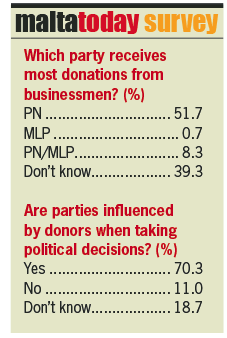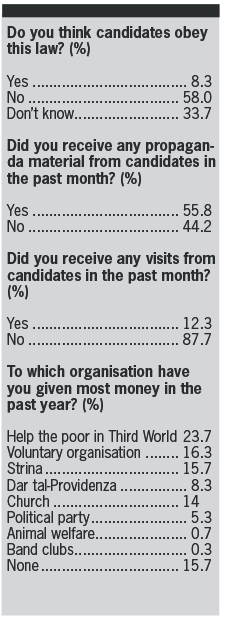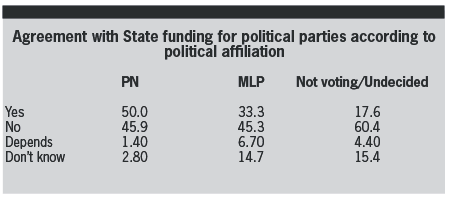
| NEWS | Sunday, 07 October 2007 70% give thumbs down to State funding of parties  The majority of the Maltese do not want to fund political parties from their taxes, with only 32 per cent agreeing with a system of State funding. The majority of the Maltese do not want to fund political parties from their taxes, with only 32 per cent agreeing with a system of State funding. The suggestion to introduce State funding for political parties was made by Prime Minister Lawrence Gonzi in the wake of the controversy generated by PN secretary general Joe Saliba’s boat trip with Zaren Vassallo. The vast majority of respondents believe that donations from big business interests influence political parties in their decisions. While 70 per cent believe that parties are susceptible to influence from big donors, only 11 per cent believe that political parties are not in any way influenced. Saliba’s boat trip also seems to have confirmed the general perception that the PN is the main beneficiary of donations from big business. Just over half the respondents – 52 per cent – believe that the PN receives the largest portion of donations from businessmen. By way of contrast, only 0.7 per cent believe that the MLP enjoys the larger share of the pie. Eight per cent believe that both big parties receive equal portions from big business.  Forty-seven per cent agree that political parties should declare donations over a certain amount. Surprisingly, 41% are opposed to this measure of transparency – an indication that a vast portion of the electorate is wary of any State interference in political life. Forty-seven per cent agree that political parties should declare donations over a certain amount. Surprisingly, 41% are opposed to this measure of transparency – an indication that a vast portion of the electorate is wary of any State interference in political life.Political party funding resurfaced as a topic of debate after Joe Saliba’s frank admission that building contractors regularly finance political parties, and revelations by this newspaper that the Malta Labour Party received funding from construction magnates such as Charles Polidano. Sister paper Illum also revealed that a company owned by Zaren Vassallo had also issued a Lm5,000 donation to the MLP. Last week, the Prime Minister announced that the government will present a motion in Parliament tomorrow to set up a Parliamentary Commission tasked with drawing up a system that regulates party funding and makes it more transparent. A similar commission appointed in 1995 had already proposed a mixture of State and private funding. Speaking on TV programme Reporter last month, Lawrence Gonzi justified State funding for political parties insisting that this would release more funds for civil society, as parties would not have to rely on fund raising marathons directly competing with charity fund raising. Support for State funding is strongest among Nationalist party voters and lowest among non-committed voters. While 50 per cent of Nationalist party voters support state funding, the statistic drops sharply to just 18 per cent among undecided and non-voters. This is a clear indication that State funding for political parties will further alienate this crucial category of voters.  Over to Labour party voters, and only one third support State funding, while 45 per cent oppose it. State financing apart, an overall majority of 47 per cent think that political parties should declare donations over a certain amount. The 1995 Galdes commission proposed that political parties should declare every individual contribution above Lm5,000. Labour had agreed to those proposals; but the PN objected, insisting that only donations over Lm20,000 should be declared. AD, in contrast, had proposed that any donation over Lm500 should be declared.  Fifteen per cent of respondents would even go further than that, insisting that any donation at all, irrespective of the amount, should be declared. A further 12.7 per cent agree with AD’s suggestion that any donation over Lm500 should be declared. Labour’s original position that only donations over Lm5,000 should be declared meets with the approval of 9.3 per cent. Only three per cent agree that only donations above Lm10,000 should be declared. But 41 per cent believe that the names of donors should never be made public. Fifteen per cent of respondents would even go further than that, insisting that any donation at all, irrespective of the amount, should be declared. A further 12.7 per cent agree with AD’s suggestion that any donation over Lm500 should be declared. Labour’s original position that only donations over Lm5,000 should be declared meets with the approval of 9.3 per cent. Only three per cent agree that only donations above Lm10,000 should be declared. But 41 per cent believe that the names of donors should never be made public. Although political parties pride themselves on receiving donations from the masses, the vast majority of respondents – 70 per cent – do not give any donations to political parties. But the 23 per cent who admit giving money to political parties are nonetheless a considerable source of money. If all those who admitted donating to political parties gave an average donation of Lm5 a year, the parties would net a total of Lm324,544 a year from private donations alone. None of those interviewed admitted giving donations over Lm100 during the past year, although seven per cent refused to state how much they give to political parties. Only nine per cent admitted giving donations over Lm10 while 14 per cent claimed giving donations under Lm10. Of the 23 per cent who give money to political parties, only five per cent claim to give more money to political parties than to civil society organisations. While only one in 20 give most of their money to political parties, a quarter prefer to donate to charities in aid of the poor in the Third World. As things stand, individual candidates are currently obliged to take an oath stating that they have not spent more than Lm600 in a campaign. However, only eight per cent actually believe these declarations. The majority of respondents (53 per cent) agree with the law capping the expenditure of candidates in an electoral campaign at Lm600. But the majority of respondents (58 per cent) believe that candidates are not abiding by the law. One thing for sure: candidates have already started spending money on their campaigns, with 59 per cent of respondents having already received electoral propaganda in their mail box. Twelve per cent have also received candidates in their own homes during house visits in the past month. Any comments? If you wish your comments to be published in our Letters pages please click here |
07 October 2007 Forget low cost, go microlight! Lowell lists 50 ‘traitors’ marked for Van Helsing-style execution Labour consultant drafted PN management plan Two fans charged with fracas at football match Setting the example on energy saving Election overshadows MEPA’s dramatic Ramla u-turn AFM finally switch on voice recording system New Hypogeum monitoring project launched Creationism: alive, well and approved by Malta’s educational authorities |
Copyright © MediaToday Co. Ltd, Vjal ir-Rihan, San Gwann SGN 9016, Malta, Europe
Managing editor Saviour Balzan | Tel. ++356 21382741 | Fax: ++356 21385075 | Email
Managing editor Saviour Balzan | Tel. ++356 21382741 | Fax: ++356 21385075 | Email